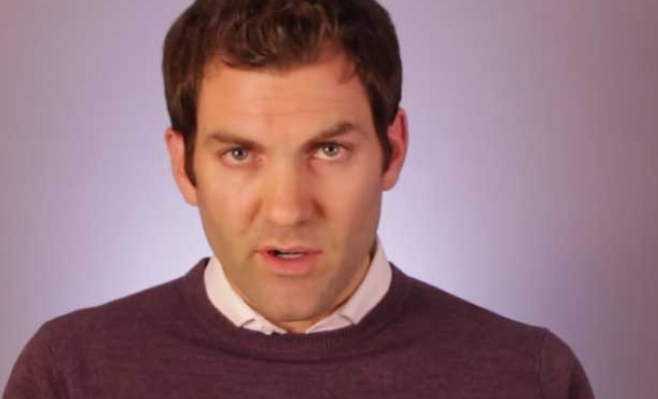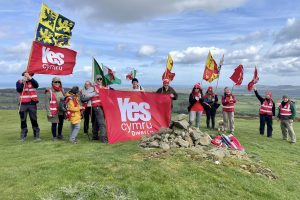
ONE of UKIP’s more colourful characters – in a party which has traditionally set the bar for eccentricity quite high – has thrown his hat into the ring for the party leader job.
Following Diane James’ fleeting spell at the helm, the role of party leader is currently occupied (again) by Nigel Farage, although it has been made clear that he is acting on an interim basis this time.
However, following the exit of bookies’ favourite Stephen Woolfe, who left the party after an alleged brawl with another MEP at the EU Parliament building in Strasbourg, John Rees-Evans announced this week that he was standing, alongside Paul Nuttall, Suzanne Evans, and Breitbart UK founder Raheem Kassam.
Mr Rees-Evans previously hit the headlines in 2014, after he was filmed telling protestors outside the opening of UKIP’s Merthyr branch that a male donkey had tried to ‘rape’ his stallion.
A series of the more outré claims made by elected members of UKIP was read out to Mr Rees-Evans, including a quotation from former UKIP Oxford chair Dr Julia Gasper, who claimed homosexuals prefer sex with animals.
His response, immortalised in full, ran thus: “Actually, I’ve witnessed that. I was personally quite amazed.
“I’ve got a horse, it was in the fields, and a donkey came up – my horse is a stallion.
“A donkey came up which is male, and I’m afraid tried to rape my horse.
“My horse bit the side of the donkey, and I had to give my horse a slap to protect the donkey.”
“So, in this case, [she’s] obviously correct but I don’t think that’s what it meant, it’s just a bizarre coincidence.”
It is worth pointing out that neither this incident, or telling a hustings that he urinated in bottles to reduce his CO2 footprint, prevented Mr Rees- Evans from getting 13% of the vote in Cardiff South and Penarth in the 2015 General Election – an increase of 11% on 2010.
Mr Rees-Evans, who grew up in Africa and was educated in 11 different schools, is a former soldier who trained with the parachute regiment.
After leaving the forces, he attempted to work as an ‘expeditioneer’, taking a wide array of jobs including pizza delivery and labouring on a building site to fund expeditions.
However, after the birth of his first child in 2003, he set up a tour company and, according to his biography, has ‘since developed a handful of other small businesses which span the tourism, business development, legal services and real estate sectors in Africa and Europe’.
Since coming to the attention of the British media, Mr Rees-Evans has had to play down a couple of the more headline-grabbing anecdotes which surround him. Prospective voters will be reassured to know that the ‘fortified compound’ in Bulgaria where Vice magazine interviewed him in 2015 is apparently little more than a garden with a wall around it.
Similarly, Mr Rees-Evans explained that rumours stating he persuaded a shop assistant in a Bulgarian Ikea store to let him carry his gun in case terrorists took over the building were also misconstrued. He admitted he did have the gun on him when he entered the store because ‘it wasn’t safe to hand it over to store security and I had some things I had to get.’.
In a recent appearance on the Daily Politics show, Mr Rees-Evans pointed out that the host, Jo Coburn, was focussing on these stories rather than his vision for the party: “Do you know, Jo, it’s really interesting what you’re doing because I am trying to tell you my serious vision for UKIP and you keep trivialising it,” he remarked.
“It [the donkey story] was a bit of playful banter with a mischievous activist. I would be so appreciative if you could please just understand the concept that I am trying to communicate to your viewers.”
One concept which has yet to be discussed was a policy proposal made by Mr Rees-Evans on his blog in the aftermath of the Paris attacks last year.
Warning that ‘a devastating Mumbai/Paris-style attack on UK soil should be considered inevitable and imminent’, he suggested that a ‘volunteer civilian defence force’, using existing Special Forces troops, followed by civilians ‘irrespective of previous military experience’ should be formed. This force, he recommended, should be ‘required to complete an advanced tactical IPSC-standard training course, with a view to obtaining proficiency in the use of several small arms, with emphasis on the Glock 17, and common variants of Kalashnikov’.
“Once qualified, VCDF marshals should be required to carry a concealed Glock 17, spare magazine, and not fewer than 30 rounds at all times, unless logged as inactive,” he suggested.
Marshals would be only permitted to engage combatants at ranges above 30m if ‘there are no innocents/ friendlies within 300 mils of marshal’s sight picture’. Firing a warning shot should also not be required due to the risk of ricochet in built-up environments.
A marshal would only be permitted to engage a target where ‘either a) a shot has already been fired or b) a combatant has raised his/her weapon to aim’.
Given that support for an armed undercover militia is patchy at best in Britain, Mr Rees-Evans may have a better chance of becoming UKIP leader if media attention continues to focus on his horse. However, it is worth mentioning that a YouGov poll taken in 2015 showed that 44% of those who voted UKIP in 2015 could imagine supporting an army coup against the elected government.
















Add Comment